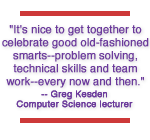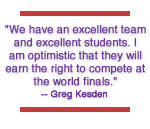|
|
||||
|
|
Carnegie Mellon Hosts Regional "Battle of the Brains"
Teams of the area's best and brightest computer programmers will square off at Carnegie Mellon University at 10 a.m. on Saturday, Nov. 6, in a regional competition of the Association for Computing Machinery's International Collegiate Programming Contest (ACM-ICPC). The team that wins the IBM-sponsored competition, which will be held in the A. Nico Habermann Computing Classroom in Wean Hall, will travel to Shanghai, China, to compete for awards, prizes and bragging rights in the world championship this April.
Established in 1970 at Texas A&M University, the International Collegiate Programming Contest has expanded into a global contest headquartered at Baylor University that involves tens of thousands of students and faculty from computing disciplines at more than 1,400 universities in 75 countries. Organizers call this "battle of the brains" the oldest, largest and most prestigious programming contest in the world.
At the Carnegie Mellon-hosted event, teams of three students will take on eight or more complex, real-world problems using only logic, strategy, mental endurance and a single computer. Under the eye of expert judges, they will have just five hours to rank the difficulty of the problem, determine the requirements, design test beds and build software systems that solve the problem. In the end, the team that solves the most problems in the least time wins. Teams receive a penalty for any incorrect solutions.
According to organizers, the contest has operated on an open-source platform for the past three years, allowing students to become familiar with Linux and Eclipse. This year, IBM will expose the teams to its POWER parallel computing technologies. Known for enormous speed, memory, storage capacity and number crunching capabilities, IBM POWER-based parallel supercomputers have been used to solve some of the most difficult problems in physics, engineering, biology, geology and the environment.
"With the reopening of the Habermann classroom a few years ago, we felt that we had the right resources organized in the right way to host the contest," said Greg Kesden, a lecturer in Computer Science and organizer of the regional contest. "It is the right thing not only for our students but for the other students in the region. It's nice to get together to celebrate good old-fashioned smarts—problem solving, technical skills and team work—every now and then."
Although the teams are young compared to the seniors and graduate students they'll likely face in competition, Kesden thinks they have a good chance at victory. "We have an excellent team and excellent students. I am optimistic that they will earn the right to compete at the world finals," he said. "Looking down the road to next year, and the few years after, we won't be stoppable."
The Carnegie Mellon students will go head-to-head with teams from 14 other colleges and universities: Allegheny College, Edinboro University, Grove City College, Hiram College, Indiana University of Pennsylvania, The Pennsylvania State University (Main Campus), Penn State-Erie, Saint Francis University, Slippery Rock University, Thiel College, the University of Pittsburgh, Pitt-Johnstown, West Virginia Wesleyan College and Youngstown State University.
"We are in one of the most competitive regions in the world," said Kesden. "I think the most competitive in the American continents."
Susie Cribbs |
||
|
Carnegie Mellon Home |
||||
 "This is the world's premier university competition in the computing sciences and engineering," said Bill Poucher, ICPC Executive Director and Baylor professor. "IBM, ACM and the world's universities have partnered to offer the best and brightest students the opportunity to challenge themselves to achieve far beyond classroom expectations so that they can build the cutting-edge technology of tomorrow."
"This is the world's premier university competition in the computing sciences and engineering," said Bill Poucher, ICPC Executive Director and Baylor professor. "IBM, ACM and the world's universities have partnered to offer the best and brightest students the opportunity to challenge themselves to achieve far beyond classroom expectations so that they can build the cutting-edge technology of tomorrow."
 Under the direction of Kesden, two teams of Carnegie Mellon students will compete in the event. The first team, the Carnegie Mellon Dragons, includes senior electrical and computer engineering student Bryan Chen, freshman computer science student Evan Danaher, and sophomore computer science students Tom Quisel and Glenn Willen. Computer science sophomore Jordan Clifford, engineering freshman Jeff Schroder, and computer science freshmen Nalin Singal and Andrew Warshaver make up Carnegie Mellon's second team, called the Cardinals.
Under the direction of Kesden, two teams of Carnegie Mellon students will compete in the event. The first team, the Carnegie Mellon Dragons, includes senior electrical and computer engineering student Bryan Chen, freshman computer science student Evan Danaher, and sophomore computer science students Tom Quisel and Glenn Willen. Computer science sophomore Jordan Clifford, engineering freshman Jeff Schroder, and computer science freshmen Nalin Singal and Andrew Warshaver make up Carnegie Mellon's second team, called the Cardinals.